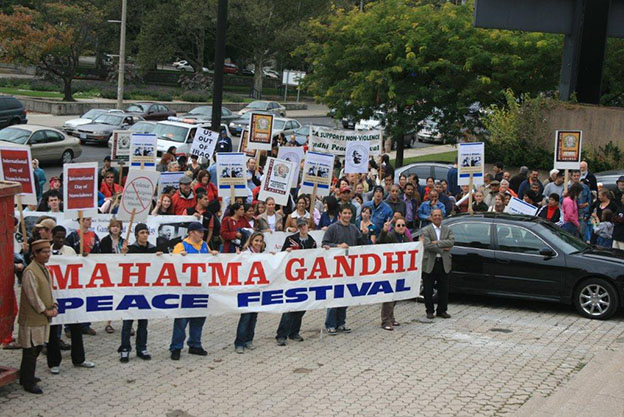Rama Singh asks, ‘Why Mac Peace Week?’

The 20th annual Gandhi Peace Festival will take place at City Hall on Saturday, Sept. 29. Rama Singh is a professor in the Department of Biology at McMaster, and a member of the University’s Peace Studies Advisory Council.
Why Mac Peace Week?
The mandate of universities lies in the creation, preservation and dissemination of knowledge. For much of its history, university education has been available only to a relatively small portion of the population.
In this sense, all universities have been ivory towers and out of reach for the common masses. However, with population growth and the increasingly technology-based economy, universities are under pressure to produce graduates who possess the qualifications needed for employment in a wide variety of professional and technical jobs. As a result, more and more students are seeking higher education; they see the university as an enabler and an enhancer of job prospects.
Universities are also currently under yet another kind of pressure; they are expected to produce citizens who are knowledgeable in the fundamentals of peace and conflict resolution, and capable of engaging in local and global communities with integrity and compassion. This pressure is the result of increasing globalization, competition and senseless violence (direct or indirect) worldwide.
The internationalization of education is creating global and integrated campuses that serve a diverse student body and connect with the broader community. Universities can no longer remain isolated and students can no longer remain uninterested in local and global affairs. Thus universities are under pressure to add “Internationalization” to their list of priorities and to provide education and training that enables students to engage, locally or globally, in community work.
McMaster University has recognized the need for “Internationalization with Integrity” and has risen to this challenge. The President’s “Forward with Integrity” initiative and the Task Force and Advisory Committee’s emphasis on Internalization and Community Engagement is a bold and timely move in this direction. In addition, McMaster’s Centre for Peace Studies has the expertise and proven experience in pursuing international peace and development work. The Annual Gandhi Peace Festival and the Gandhi and Bertrand Russell Lectureships have subsequently added to McMaster’s international reputation and global engagement.
Mac Peace Week is a week-long celebration of peace-related events, running this year from Sept. 24-29 and presented by the Mac for Peace Society (mcpeace@mcmaster.ca). The Mac for Peace Society was created to provide students with an opportunity to engage with a broad range of local and international issues – including poverty, inequality, sustainable development, violence against women, climate change, racism, and other issues that relate to creating a vibrant community based on peace, justice and human dignity.
Mac Peace Week is linked to the Annual Gandhi Peace Festival to be held at the City Hall on Saturday, Sept. 29, 2012 from 10 a.m. to 3 p.m. Admission to the Gandhi Peace Festival is free, and all are welcome. Among the confirmed speakers are McMaster President and Vice Chancellor Patrick Deane; Hamilton Mayor Bob Bratina; Consul General of India, the Hon. Preeti Saran; and South African Consul General, the Hon. Tselane Mokuena, who will deliver the keynote address.
The City is also honoring the 20th anniversary of the Gandhi Peace Festival by erecting a full- size statue of Gandhi, which is a gift from the Government of India and the local Indo-Canadian community. The Gandhi Bust that McMaster received last year now sits in Gilmour Hall.
